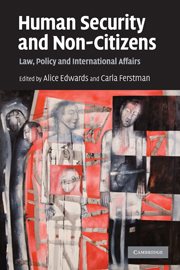Book contents
- Frontmatter
- Contents
- About the editors
- About the contributors
- Preface
- Acknowledgements
- Part I Human security, human rights and human dignity
- Part II Physical and legal security, armed conflict and refuge
- Part III Migration, development and environment
- Part IV National security and the ‘war on terror’
- Index
Preface
Published online by Cambridge University Press: 17 February 2011
- Frontmatter
- Contents
- About the editors
- About the contributors
- Preface
- Acknowledgements
- Part I Human security, human rights and human dignity
- Part II Physical and legal security, armed conflict and refuge
- Part III Migration, development and environment
- Part IV National security and the ‘war on terror’
- Index
Summary
In 1994, the United Nations Development Programme (UNDP) stated that the concept of security had been too narrowly construed for too long as security of territory from external aggression, as protection of national interest in foreign policy, or as global security from the threat of a nuclear holocaust. Arguing that it is time to move beyond the narrow concept of national security to ‘an all-encompassing concept’ of ‘human security’, the UNDP identified two main components of this new approach:
It means, first, safety from such chronic threats as hunger, disease and repression. And second, it means protection from sudden and hurtful disruptions in the patterns of daily life.
In 2003, the UN Commission on Human Security issued its final report in which it concluded that:
Human security means protecting vital freedoms. It means protecting people from critical and pervasive threats and situations, building on their strengths and aspirations. It also means creating systems that give people the building blocks of survival, dignity and livelihood. Human security connects different types of freedoms – freedom from want, freedom from fear and freedom to take action on one's own behalf. To achieve human security, it offers two general strategies: protection and empowerment.
The framework aims to treat human security, human rights and human development as mutually reinforcing goals. The new framework centres directly and specifically on people, allowing them to live in safety and dignity and to earn a livelihood, rather than on the state and its security or sovereignty.
- Type
- Chapter
- Information
- Human Security and Non-CitizensLaw, Policy and International Affairs, pp. xix - xxvPublisher: Cambridge University PressPrint publication year: 2010

